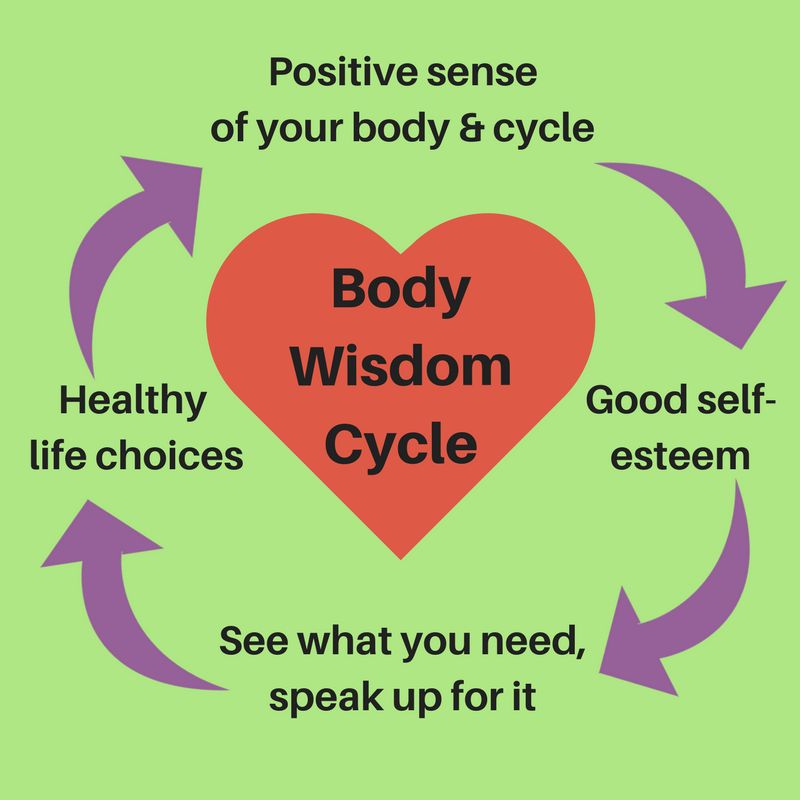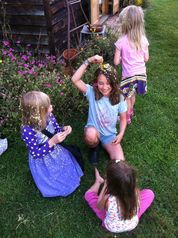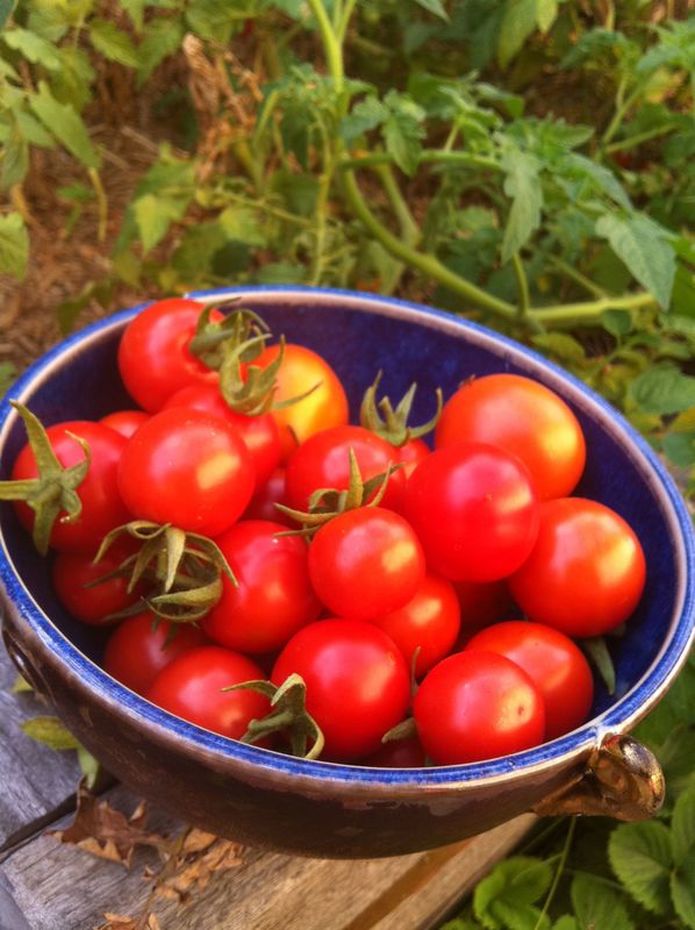 Your daughter's journey into womanhood is directly influenced by what she sees around her Your daughter's journey into womanhood is directly influenced by what she sees around her We cross the bridge into adulthood having watched how our parents treat and talk (or don’t talk) about their own bodies, relationships and needs, and this can go a long way to supporting our own positive sense of our body and self. Imagine you’re a baby getting your nappy changed. Your mum screws up her face and says ‘Stinky poo!’ You don’t understand the words yet but you hear the disapproving tone as she cleans up the ‘mess’ that you had enjoyed pushing out. Over time, you learn to hide your bodily pleasure. Imagine you’re a toddler, and your parents teach you to wash yourself ‘down there’ and never actually use the word vulva. Over time, you learn that talking about your sexual organs is not acceptable. Imagine you’re primary school age, and it’s normal for you to hear your mum complaining about her weight, wishing that her belly were smaller, comparing other people’s legs to hers and seeing her go on diets. Over time, you learn to compartmentalise and objectify your body. Imagine you’re a teenager, and your parents have only ever talked with you about sexuality once, when your body first started changing. They’ve never talked with you about the pleasures of intimacy with a partner. Over time, you learn that this is not something you learn about or discuss with your loved ones. Developing a healthy connection to your sexuality begins early in life and continues through your primary school years, even before puberty’s changes. Five-year-olds can learn about consent and internalise their rights and skills in giving a clear yes or clear no to how they are treated by others. I’ve heard that sexual predators prey on the less confident children. If a child doesn’t know the parts of their body or can’t speak up about their boundaries, it’s easier to keep them silent around something they sense is shameful. Criteria for emotional well-being … and sexual interest and satisfaction If a young person has low self-esteem, limited ability to self-soothe, poor coping skills and negative body image, they will struggle, according to Evelyn Resh, author of The Secret Lives of Teen Girls. We want our children to connect with themselves and their own needs, and enjoy intimate relationships. Resh’s criteria for this are: Reflection questions and/or strategies for parents from Secret Lives of Teen GirlsAround your own approach
Around conversation about bodies and sexuality Normalise sex and sexuality in conversations, both with your daughter and in your own life.
Around self-care She needs to see you live a life that includes sensual pleasure for you! How do you feel about your own body? Are you connected to your menstrual cycle and its associated changes in body, mood and energy?
Around rules Reflect on your experience as a teen and your parenting now. Are you repeating your mother’s style or have you adapted your rules to what’s appropriate for your daughter and these times?
Around Sexually Transmitted Infections (STIs)
The cost of hidden stress and why we need to speak up Let's be warriors AND magic-workers Let's be warriors AND magic-workers When the body says no: Exploring the stress-disease connection, Mate, Gabor, 2003, John Wiley & Sons, Inc, NJ. This book both shocked and inspired me. It may seem odd that I’m referencing a book called When the body says no: Exploring the stress-disease connection from my Daughters and Sexuality workshop, but I really believe we need to help our children to listen to their bodies, recognise what they need (and deserve to have), and then have the confidence to speak up for this, either in relationships or with health professionals. This book freaked me out a little, because it looks at all the ways that putting others before yourself, denying your own needs (and gut feeling, which can be ignored so often that you no longer recognise it), staying cheerful and repressing anger lead to long-term stress on your body, which can then emerge with scary effects on your auto-immune system. And parents beware: we learn these ‘skills’ from our family of origin. Maté’s seven As of healing - and how I believe they relate to your daughter's sexualityAcceptance The willingness to recognise and accept how things are, and the courage to permit negative thinking. Awareness We can learn to read symptoms not only as problems to be overcome but as messages to be heard. Anger Repression of anger is a major risk factor for disease, but anger differs from rage or hostility. Healthy anger is an empowerment, but repression and rage represent fear of the genuine experience of anger. Autonomy People suffer when their boundaries are blurred. Boundaries and autonomy are essential for health. Autonomy is the development of that internal centre of control. Attachment Connection is vital to healing. Behind our anger lies a deeply frustrated need for truly intimate contact. Healing both requires […] regaining the vulnerability that made us shut down emotionally in the first place. Assertion Assertion challenges the belief that we must somehow justify our existence. It is being, irrespective of action. Affirmation Health rests on 3 pillars: the body, the psyche and the spiritual connection. To ignore any one of them is to invite imbalance and dis-ease. Now, this is a mighty list of ideas, and I'm not saying that you're doomed if you're not perfectly well-adjusted. Believe me, I have to put my hand up for plenty of mistakes and bad habits in how I live and relate to others. All we can do is keep building our awareness and compassion, for ourselves as much as for those around us. But if you’re true to yourself, speaking up for what you like and don’t like, you’re much more likely to have friendships, relationships and sexual experiences that are mutually pleasurable, fun and nurturing for you. Which means that you can live sustainably and well, doing good and caring for our world. And I don't know about you, but that's all I'm after. World peace and a great life for everyone. References I mention in my Daughters and Sexuality workshopHere’s a list with some overview of what each reference is about. If you recall one that I mentioned that isn’t here, please ask me! I have a resource booklet that includes reviews, resources and quotes from them, which you can email me to purchase a copy for $15 plus postage. : )
TED Talks Listening to shame and The power of vulnerability by Brene Brown. Her work is powerful. If you haven’t seen these or read any of her books, please do! A Blessing not a Curse: A Mother daughter guide to the transition from girl to woman, Bennett, Jane A great guide, with stories, practical tips and great cultural stories, too. The Secret Lives of Teen Girls: What your Mother Wouldn't Talk About but your Daughter Needs to Know, Resh, Evelyn 2009, Hay House Inc, California, USA. This was the book that inspired me to first present this workshop on daughters and sexuality. I highly recommend it. Queen Bees and Wannabes Wiseman, Rosalind. Really readable, insightful and practical, including examples of what to say to your daughter in various tricky friendship situations, looking also at pressures of body image and expectations in teen relationships. Eye-opening and helpful. Things Girls Need from their Fathers An article from the Huffington Post, posted 06/18/2013. This is really great for all parents to read, and makes infinite sense. As soon as you have a baby is a great time to read this! Linked to a similar article for what is needed from mothers. Talk Soon. Talk Often. A guide for parents talking to their kids about sex. Free downloadable booklet from Government of Western Australia Departent of Health. A great guide for what is appropriate to say when, with examples. Nice layout with lovely pics, too! When can teenagers have a partner sleep over? Article by Maddy Silver, Sydney Morning Herald 17/3/14. Really great food for thought. Compares the Netherlands and the USA; in the former case, with parents more open and accepting of teen sexual relationships, there’s less teen pregnancy. Puberty Girl Movsessian, Shushann 2004 Allen and Unwin, Sydney. This is for mature pre-teens and teens – really friendly language that tells you the straight-up facts in a non-medical way. TED Talk: Your body language may shape who you are, Cuddy, Amy (who also researched and wrote the great book called Presence: Bringing your boldest self to your biggest challenges, 2016 Orion, London. Great research on power poses and how you can develop greater self-confidence.
1 Comment
Do you listen to your body?
If you get to a yoga class or the gym a couple of times a week, eat as well as you can and don’t often punish your body, why aren’t you feeling vibrant? Women are really good at getting the job done and looking after everyone else - and everyone else’s projects. Many of us are ok at self-maintenance, too. But we need more. The trouble is, we often see other people’s needs as more urgent than our own. Don't pass on martyr practices If you want your daughter to avoid the self-sacrifice trap, you need to show her the way. As girls, very few of us were taught or given great role models of self-care, let alone inspired to listen to our bodies as a top priority. Every week, every day, your body and your menstrual cycle are telling you something. Here's an example of what you can do to listen. 1. Take a few minutes each day Jot down what you noticed about yourself that day. I do it just after I’ve got into bed. A few words or symbols for things like:
2. Find the gold You’ll start to notice patterns, and within a couple of months, you can begin to anticipate how you’re likely to be feeling. This is gold. 3. Use the gold Plan around what you can anticipate. It's great to recognise your needs, but that's just one part. You can only make huge and positive shifts in your health and well-being when you consider it urgent to take action on nurturing yourself. Here's what you can do For example, after charting your cycle, you'll know you’re close to a low energy period (pardon the pun), and you can do something about it. Instead of becoming fed up and overworked at a time when you’re feeling extra sensitive and low in energy, you can neatly sidestep that sense of overwhelm by rearranging your schedule or allowing shortcuts for yourself before you reach the end of your tether. Time to shine There are other advantages, too. For women who want to
Even if a woman never wants to become a parent, it’s handy to know when you are ovulating (releasing an egg that could be fertilised to make a baby). It’s a great time to plan for parties and being productive, as our body’s hormones are telling us that now is the time to get out there and shine! Self-care has extended benefits If you can get into this practice of self-care and share it with your daughter, it will benefit both of you. And those who live and work with you. Our own well-being isn’t just important; it’s an urgent priority. Please have a play in our new look website or get in touch if you'd like to know more. Have a wonderful and fulfilling day! Warmly Janoel Now taking bookings for 2016: A Celebration Day for Girls 1.5 day workshop for 10-12 year old girls and their mother/female carer Step into Womanhood Mother Daughter Bali Retreat July 2016 for 11-13 year old girls and their mother/female carer. Coming up soon: Fathers Celebrating Daughters workshop with Janoel Liddy for fathers of tween and teen girls to prepare for a positive transition to puberty and growing up. Monday 23 November 2015 7.00 pm – 9.00 pm Venue: 108 Cramer St (Cnr Gilbert Road), Preston West Cost: $35 For the workshop and resource materials Enquiries/Bookings: Janoel Liddy on ph: 0408 664 919 or email: [email protected]  Regular rituals of self care are a vital gift to both you and those around you. I read once that ritual is routine made sacred, and it makes so much sense. Taking time out of your day, even if only for a matter of minutes, for your own ritual brings you back into your self-awareness, clears your head and gives you precious space to gain perspective. One of my nightly rituals is simply recording in my moon diary how I felt that day; my mood, energy levels and any menstrual or body symptoms I've experienced. I can see patterns, giving me a reality check if I need one. It's so easy to over-commit and overdo things otherwise! Each morning before breakfast, I walk our dog by the creek. As I walk over the hill, I sing a chant in my head: 'As the sun rises, I face the open sky. And as the sun sets on my life, I'm not afraid to die.' It charges and cleanses me. We sang this together as a community after my dear friend Mirabai had passed away, so it has a poignant sense of loving life for me. I run mother-daughter coming of age retreats in Bali, as well as Celebration Day for Girls workshops for young girls and their mothers, to welcome and prepare them for the transition to menstruation and womanhood. These are beautiful learning experiences for the girls and their mothers, where we celebrate loving ourselves and valuing our own divine feminine. It’s wonderful to have an adventure, special trip or workshop on the divine feminine, but your daily life is where the ongoing magic happens. In our programs, we share rituals of self-care that all of us can do, like taking time out to write or draw in your journal, rest, withdraw - when you're bleeding or simply whenever your body tells you it's time." I’m a strong believer in the power of your own regular women's circle. Anyone can start one, and the rewards are so rich for a simple matter of committing time and following some basic ground rules for yourself and your sisters in circle. Earlier this year, I ran a workshop on creating your own women's circle at the Seven Sisters Festival in Mt Martha with my friend and colleague Jac Torres-Gomez. We had over-full sessions, with more than a hundred sisters joining us; women are hungry for this. It’s time for us to create what we need in our lives! Women’s circles are a safe and sacred place where you can feel powerful, inspired, recharged, challenged, reassured... If you set it up properly, it can offer profound life-changing benefits. I’ve been meeting monthly on the dark moon for over 13 years now, and we plan to continue until we’re little old luscious women. Taking time out to share with others helps us to find the divine in our life. Ritual for you is when you consciously take time out to honour yourself. I love my regular yoga class, where, without fail, I walk away blissful. Moving meditation, in the form of a 5Rhythms dance class, is a precious part of my practice, because it feeds me, deeply. Maybe yoga and dance aren’t your thing like they are mine. Daily meditation is a gift you can give to yourself free of charge. Taking a moment to bless your food, even if silently as you pause before the first mouthful, creates a sacred moment. How about setting a reminder in your phone to check in with yourself? I dare you to do it every day for a week, committing to some ritual of self-care. After all, you’re the best person to consult about looking after yourself. It’s up to you to discover and live your own divine feminine. The reality is that if you look after yourself, you'll feel better. And in feeling good about yourself, your positive approach will affect those around you. So what's the point of being a self-denying trooper who has to get all the work done before she rewards herself? When I do that, I end up resenting my partner, because he has the knack of ignoring the dirty floor or dishes when he's tired. A skill I am still working on.
What I have also learned is that if I look after myself, do things that I love regularly and give myself time out when I need it, my family and community benefit. I bounce back, with more ideas and energy than what would be the case if I had simply kept trudging on. So, here's a Self Care Quiz to test where you are at (on the right hand side of this page). 10 Questions. Not hard. Your score may not be as high as you anticipated. If it isn't, use it as a really great excuse to look after yourself more. Some things are easy to change. Others, like leaving a job, are big. Go ahead and look after yourself. You're worth the investment. After all, think of all the time you have to spend with you over the rest of your life. And if you score a perfect 10 - well done. Now go and inspire a friend or colleague to love life the way you do. I'd love to know what you think of the quiz and your score - comments welcome! |
Author
-Janoel Liddy is passionate about girls and women recognizing and acting on their needs to lead a satisfying life. She teaches puberty and wellbeing to girls and boys in schools, facilitates workshops and retreats and works with groups in TAFE, university and community organisations in training and events. She is a mother of two with her partner of over two decades and dances, cooks, reads and writes when she can and must. Categories
All
Archives
April 2018
|



 RSS Feed
RSS Feed